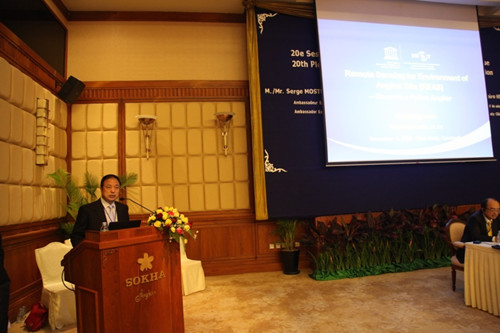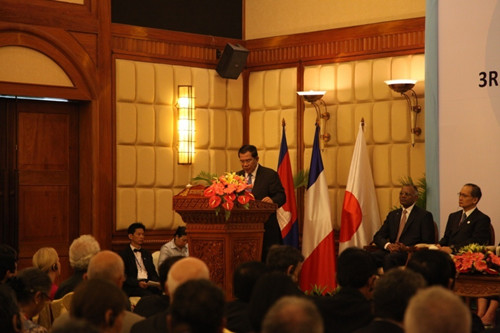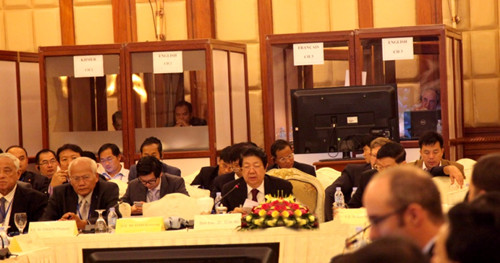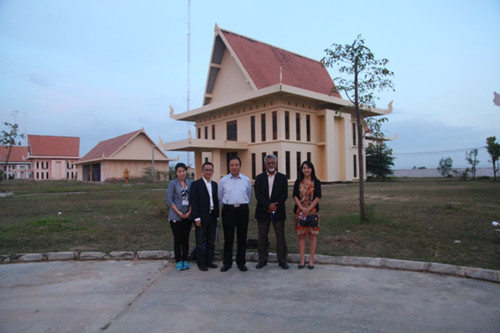Upon the invitation of the Authority for the Protection of the Site and Management of the Siem Reap-Angkor Region (APSARA) , Prof. GUO Huadong, Director of the International Centre on Space Technologies for Natural and Cultural Heritage (HIST) and Director-general of the CAS Institute of Remote Sensing and Digital Earth (RADI), led a five-member delegation to the 22nd Technical Session and the 20th Plenary Session meetings of the International Coordinating Committee for the Safeguarding and Development of the Historic Site of Angkor (ICC-Angkor), and the 3rd Intergovernmental Conference held from December 3 to 5, 2013, in Siem Reap, the Kingdom of Cambodia. The events brought about more than 400 scholars, experts and representatives of the governments of more than 20 countries, international organizations and foundations.
December 4 witnessed the opening of the 20th Plenary Session of ICC-Angkor, which was focused on the importance of new technologies and methods in protecting the Historic Site of Angkor and its sustainable development. Cambodian Deputy Prime Minister Dr. Sok An was present and gave welcome remarks. Prof. Guo delivered a plenary talk, reporting the progress of the environment remote sensing project for the Angkor Heritage Site conducted by a Chinese team.
Since the signing of the MoU between HIST and APSARA in June 2013, the team has carried out a dynamic monitoring of the Angkor region in terms of vegetation, water resources, and land subsidence by using space technologies. Efforts have also been made in developing a data base and a 3-D virtual demonstration platform for the Historic Site. To serve the sustainable development of the Angkor Site, the project initiated the monitoring of the time-space characteristics of environmental element changes of the Site and its surrounding areas over the past 40 years, the development of a space information database and an interactive 3D visualized information management system for the Site by using a variety of multi-source remote sensing and fundamental geographic data.
Following the meeting’s theme on the future outlook in safeguarding and development of the World Heritage Site, Prof. Guo’s report demonstrated the importance of space technology for the protection of the Site, and the development and objectives of the project in the future. The report was spoken positively by the audience, as well as officials and representatives of the Cambodian government, APSARA, Phnom Penh Office of UNESCO, and Chinese Embassy in Cambodia.
An Angkor Statement was passed at the meeting. It confirms the remarkable achievements of the international community in the protection of Angkor Historic Site over the past 20 years, stressing the importance of wide range international partnerships in the efforts, presenting a request for the sustainable development and comprehensive management of living heritage of Angkor, and emphasizing the important role of new technologies and concepts in its future protection. The 1st intergovernmental conference was held in Tokyo in October 1993 and the 2nd conference took place in Paris in November 2003.
A technique exhibit panel on the environmental remote sensing of Angkor was held during the meeting. Accompanied by APSARA officials, the HIST group also visited a villa specially offered by the Cambodian government for the project.
The technical and plenary sessions of the Angkor-meeting is held regularly by the UNESCO for the protection of the historical site. A total of 20 sessions have been held since 1992 when the site was inscribed in the UNESCO World Heritage List. A standing secretariat has been set up for the meetings. The reason for ICC-Angkor is to ensure the consistency of the different projects, defines, when necessary, the standards, and calls the attention of the concerned parties when required.Hosted by RADI, HIST is the first of its kind to apply space technologies for monitoring and preserving natural and cultural heritage under the auspices of UNESCO.

Prof. GUO Huadong speaks at the plenary session of ICC-Angkor.

Cambodian Prime Minister Hun Sen is present to give opening remarks.

Presided over by Cambodian Deputy Prime Minister Sok An, the 3rd Intergovernmental Conference convenes on December 5.

A visit to the office of the environmental remote sensing project in Angkor.